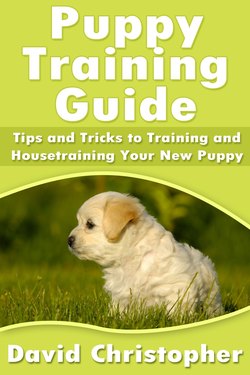Читать книгу Puppy Training Guide: Tips and Tricks to Training and Housetraining Your New Puppy - David Inc. Christopher - Страница 6
На сайте Литреса книга снята с продажи.
Basics of Puppy Ownership
ОглавлениеPart of the magic of owning a puppy is that you will bond with the puppy, and the more love you give and the more time you spend with your puppy, the stronger that bond will be.
Your puppy will love and respect you, so you should always treat your puppy with nothing less than the best that you can offer, which is to love your puppy and spend time with them.
You will need to groom your puppy, exercise your puppy, train your puppy, and just spend time in general with your puppy.
If you have not got a lot of time to spend with a puppy, perhaps a puppy is not for you, they need love and affection from their owners, especially as puppies, when the bonding process works the best.
A few do’s and don’ts of owning a puppy:
Do make sure that you puppy knows when it is showing correct behavior by showing love, attention and lots of praise. If your puppy plays with his toys at playtime instead of your slippers, make sure that the puppy knows that they made the right choice by praising the puppy, same for each time your puppy goes to the bathroom in the right spot, or just is behaving in general.
Do help your puppy learn to be housetrained by picking one spot for housetraining and sticking to that spot. Instead of taking puppy to different parts of the yard to go, always take your puppy to one spot, or if you are using puppy pee pads, always keep the pads in the same spot. Changing up where you puppy goes potty at will only confuse them and cause more accidents.
Do have plenty of toys on hand of several varieties for your puppy, including chew toys. If your puppy is chewing on something they should not be, tell them no, and give them a chew toy, praise them when they begin to chew on the toy instead.
Do not encourage your puppy to play with your hands or feet as toys, this will only tell your puppy that biting is acceptable and although tiny puppy teeth do not hurt, it will hurt when the puppy grows up. It is best to train you puppy that they are never to nip or bite at hands or feet.
Do not allow your puppy to get away with behavior that you do not want them doing when they are fully-grown. For example, you might think it is cute to let your tiny puppy sleep on the bed, but not a full-grown dog, but if you let your puppy do it, they will not understand why they cannot do it once they get older. For the sake of your sanity and to save a lot of frustration do not let your puppy get away with things unless you do not mind that same behavior in your adult dog.
Do not give your puppy attention for behaving wrong; the best course of action is to ignore the puppy. Otherwise, the puppy will realize that by behaving wrong, they will at least some attention. Shower your puppy with praise when they are behaving well and ignore them when they are not.
Just like with humans, the types of food that a puppy gets will make a difference with your puppy’s health.
The better quality of food you feed your puppy, the better their health will be. You can talk to your veterinarian or a pet store associate as to the best kind of puppy food to give your puppy.
There are many choices of types of food, so many so that it can seem overwhelming. In order to avoid processed and artificial ingredients we suggest that you feed your puppy food that is all natural ingredients and avoid the cheapest brand out there, stick with brands that are well known and that have a good reputation.
Your vet and any pet store associate will be able to help you select the best choice for your puppy, and of course, your puppy needs to like what you are feeding them, if they do not like one food, try another kind and mix the two together and then when the food that they did not like is gone, just give them the food that they do like.
You will need to get a veterinarian for your puppy and after getting your puppy, schedule an appointment for your puppy to get a general exam and wellness check and they will need to get their vaccinations, especially for rabies.
You should get your puppy spayed or neutered when they are around six month old.
You can even purchase pet insurance for your pet, which is like health insurance, you pay a monthly premium, and then you only pay a portion of the vet bills when you have to take your puppy in.
You will need to provide a leash and collar for your puppy, and the collar should have an ID tag, you might want to consider having your pet micro chipped as well.
Your puppy will need a food dish, a water dish and toys and chew toys.
In addition to those, your puppy will need a dog bed that they can call their own and a blanket, you can also get a crate or a kennel, a crate will be necessary if you are planning on crate training the puppy.
